JetBrains AI vs Copilot: Key Differences, Features, and Best Use Cases (2025 Guide)

Table of Contents
The landscape of software development continues to evolve with AI-powered coding assistants transforming how developers approach their daily tasks. Jetbrains AI vs Copilot represents the cutting edge of this technological revolution in programming environments. These intelligent tools enhance productivity through contextual suggestions and automated code generation capabilities. The Jetbrains AI vs Copilot comparison has become increasingly important as developers search for the assistant that best fits their workflow. Both solutions leverage sophisticated machine learning models to understand code context and anticipate developer intentions. The integration of these AI assistants into development environments signals a fundamental shift in programming methodology. This comprehensive analysis explores how these two leading solutions compare across essential dimensions of functionality and real-world performance.
主要ポイント
- Readers will get to know how JetBrains AI and GitHub Copilot compare as leading AI coding assistants.
- Understand the key features, strengths, and differences between both tools.
- Discover where JetBrains AI fits best in enterprise and IDE-focused workflows.
- Explore how GitHub Copilot supports rapid prototyping and cross-platform development.
Learn how to choose the right tool based on project needs, IDE preference, and budget.
Table of Contents
What is JetBrains AI?
JetBrains AI functions as an intelligent coding assistant deeply embedded within the JetBrains family of integrated development environments. This technology works seamlessly across popular IDEs including IntelliJ IDEA, PyCharm, WebStorm, and other JetBrains products. The assistant analyzes surrounding code to provide contextually relevant suggestions while developers write code. JetBrains AI comprehends project structure, coding patterns, and developer intentions through its advanced contextual awareness.
The system offers natural language processing capabilities that translate requirements into functional code snippets. Developers can interact with JetBrains AI through conversational prompts or by highlighting specific code sections. The assistant explains complex code blocks, suggests potential optimizations, and helps troubleshoot errors within the familiar IDE interface. JetBrains AI utilizes multiple language models including proprietary solutions and integration with external models like Claude.
This tool represents JetBrains’ strategic response to growing demand for AI-enhanced development environments. The assistant maintains awareness of project dependencies, frameworks, and libraries throughout the codebase. JetBrains AI operates through a credit-based system with allocations varying by subscription level and usage patterns. The technology receives regular updates expanding its capabilities and language support across diverse programming domains.
Key Features of JetBrains AI
JetBrains AI delivers seamless integration across the entire JetBrains ecosystem with consistent functionality in all supported IDEs. The system provides intelligent code completion that understands project structure, imported libraries, and established coding patterns.
Natural language capabilities allow developers to describe desired functionality and receive appropriate code suggestions. The assistant excels at explaining complex code with detailed annotations about functionality and implementation approaches.

Key capabilities of JetBrains AI include:
- Deep integration throughout the JetBrains ecosystem
- Context-aware code completion understanding project structure and patterns
- Natural language processing for efficient code generation
- Comprehensive documentation generation for functions, classes, and modules
- Debugging assistance identifying potential issues with suggested fixes
- Code refactoring recommendations to improve quality and maintainability
- Enterprise security compliance with private cloud deployment options
The assistant generates intelligent tests based on implementation code and expected behaviors. JetBrains AI supports multiple programming languages including Java, Python, JavaScript, and Kotlin with specialized suggestions. The system includes customizable settings to align with individual coding styles and preferences. Integration with version control provides context-aware suggestions based on repository history.
JetBrains AI features advanced code navigation through natural language queries about codebase structure. The assistant supports collaborative programming scenarios with team-oriented suggestion capabilities. Regular model updates ensure the assistant continuously improves in accuracy and capabilities. The credit-based usage system provides flexibility based on actual development needs.
What is GitHub Copilot?
GitHub Copilot functions as a collaborative AI coding assistant developed through partnership between GitHub and OpenAI. The system utilizes the powerful Codex model derived from OpenAI’s GPT architecture specifically trained on code repositories. Copilot acts as an AI pair programmer suggesting code completions as developers type within their editor. The assistant works with multiple development environments including Visual Studio Code, Visual Studio, and JetBrains IDEs.
Copilot analyzes context from open files, comments, and function signatures to generate relevant suggestions. The system transforms natural language comments into functional code implementations across numerous programming languages. GitHub Copilot learns from usage patterns to provide increasingly personalized suggestions matching developer preferences. The assistant understands popular libraries, frameworks, and coding conventions across different ecosystems.
Copilot offers complete function generation based on descriptive names and docstring descriptions. The system provides real-time suggestions appearing directly within the editor as ghost text for easy acceptance. GitHub Copilot leverages knowledge from millions of public repositories to inform its suggestions. The assistant supports both common programming tasks and specialized domain-specific implementations.
Copilot evolves through regular model updates and expanded capabilities based on user feedback. The system operates primarily as a cloud service with suggestions generated through secure API connections. GitHub Copilot represents a significant advancement in AI-assisted development with comprehensive language support. The tool accelerates development workflows while maintaining developer control over implementation decisions.
Key Features of GitHub Copilot
GitHub Copilot delivers extensive multi-language support across major programming languages and specialized frameworks. The system provides inline code suggestions that appear as you type without disrupting workflow. Copilot transforms natural language descriptions into complete function implementations based on comments. The assistant supports multiple editors including Visual Studio Code, Neovim, and JetBrains IDEs.

Core features of GitHub Copilot include:
- Comprehensive multi-language support for major programming languages
- Inline code suggestions appearing naturally as you type
- Natural language transformation into complete function implementations
- Cross-platform editor integration with VS Code, Neovim, and JetBrains IDEs
- Deep GitHub ecosystem integration with repository context awareness
- Alternative suggestion capabilities offering multiple implementation approaches
- Test generation based on implementation code with appropriate frameworks
GitHub Copilot generates documentation for functions and classes based on implementation details. The system explains complex code snippets to help understand unfamiliar patterns. Copilot suggests API integrations based on imported libraries and common usage patterns. The assistant provides intelligent auto-completion for repetitive patterns and reduces boilerplate code.
Copilot includes specialized capabilities for web development including HTML, CSS, and JavaScript frameworks. The system generates database queries for common operations across SQL and NoSQL databases. Copilot creates regular expressions based on natural language descriptions of pattern matching needs. The assistant learns continuously from user acceptance patterns to improve future suggestions.
JetBrains AI vs Copilot: Head-to-Head Comparison Table
| Feature | JetBrains AI | GitHub Copilot |
| IDE Integration | Deep integration with JetBrains IDEs only | Works across VS Code, Neovim, JetBrains IDEs |
| Language Support | Strong support for JVM languages, Python, JavaScript | Broad language support across major programming languages |
| Code Completion | Context-aware with project structure understanding | Inline suggestions with alternative options |
| 自然言語処理 | Supports code generation from descriptions | Excellent comment-to-code transformation |
| Debugging Assistance | Advanced debugging suggestions and explanations | Limited debugging-specific features |
| Documentation Generation | Comprehensive documentation capabilities | Basic documentation generation |
| Pricing Model | Credit-based system with subscription tiers | Flat monthly/yearly subscription |
| Offline Capabilities | Limited offline functionality available | Requires constant internet connection |
| Enterprise Features | Strong enterprise security and compliance | GitHub Enterprise integration |
| Context Window | Understands entire project structure | Primarily focused on current file context |
| Customization | Highly customizable suggestion behavior | Limited customization options |
| Learning Curve | Requires familiarity with JetBrains ecosystem | Minimal learning curve for basic usage |
| Collaboration Features | Limited collaboration-specific features | Strong GitHub-based collaboration |
| の監査 | Optimized for JetBrains environments | Consistent performance across platforms |
| Privacy Controls | Advanced data protection options | Basic privacy settings available |
Key Differences Between JetBrains AI and Copilot
JetBrains AI provides deeper IDE integration with seamless access to all IDE features during AI interactions. Copilot offers broader editor support across multiple platforms beyond the JetBrains ecosystem. JetBrains AI demonstrates superior context awareness with understanding of entire project structures and dependencies. Copilot excels at generating code from natural language comments with remarkable accuracy across domains.

The pricing models differ significantly with JetBrains AI using a credit-based system tied to existing subscriptions. Copilot employs a straightforward monthly subscription model regardless of usage volume or patterns. JetBrains AI provides more extensive debugging assistance with intelligent error resolution suggestions. Copilot offers stronger GitHub ecosystem integration with awareness of repository patterns and collaboration features.
Key distinctions between the platforms include:
- JetBrains AI provides deeper IDE integration while Copilot offers broader editor support
- JetBrains AI uses a credit-based pricing model versus Copilot’s flat subscription approach
- JetBrains AI offers superior debugging assistance and enterprise security controls
- Copilot provides better GitHub integration and performance with large codebases
- JetBrains AI features more comprehensive documentation generation capabilities
- Copilot demonstrates better support for niche programming languages and frameworks
JetBrains AI includes more advanced customization options for controlling suggestion behavior and frequency. Copilot provides a more streamlined experience with minimal configuration requirements for immediate productivity. JetBrains AI features superior enterprise security controls including private cloud deployment options. Copilot demonstrates better performance with large codebases due to its training on millions of repositories.
Similarities Between JetBrains AI and Copilot
Both assistants provide AI-powered code suggestions that significantly accelerate common development tasks. JetBrains AI and Copilot support multiple programming languages with strong coverage of popular technologies. The tools enhance developer productivity through intelligent autocompletion and boilerplate code reduction. Both assistants understand code context to provide relevant suggestions based on surrounding implementation.
JetBrains AI and Copilot transform natural language descriptions into functional code implementations. The assistants help developers learn new frameworks through contextual examples and pattern recognition. Both tools maintain user privacy with options to exclude sensitive code from training data. JetBrains AI and Copilot receive regular updates to improve suggestion quality and expand capabilities.
The assistants support test generation capabilities to ensure code quality and coverage. Both tools reduce cognitive load by handling routine coding tasks automatically. JetBrains AI and Copilot integrate with version control systems for context-aware assistance. The assistants provide code explanations to help developers understand complex implementations quickly.
Both tools maintain developer autonomy with suggestion-based approaches rather than automatic code changes. JetBrains AI and Copilot support modern development practices including microservices and cloud architectures. The assistants help maintain consistent coding standards across projects and teams. Both tools accelerate onboarding processes for developers joining existing projects.
Best Use Cases for JetBrains AI
JetBrains AI excels in enterprise environments requiring deep IDE integration and comprehensive security controls. The assistant performs exceptionally well for Java, Kotlin, and other JVM language development projects. JetBrains AI provides superior support for complex debugging scenarios with contextual assistance and explanations. The system offers excellent capabilities for large-scale refactoring projects requiring deep codebase understanding.

Optimal scenarios for JetBrains AI include:
- Enterprise environments requiring deep IDE integration and security controls
- Java, Kotlin, and JVM language development projects
- Complex debugging scenarios needing contextual assistance
- Large-scale refactoring projects requiring deep codebase understanding
- Teams already invested in the JetBrains ecosystem
- Projects with strict data privacy compliance requirements
The assistant supports legacy code maintenance through intelligent analysis and modernization suggestions. JetBrains AI helps developers understand unfamiliar codebases through contextual explanations. Projects requiring strict data privacy compliance benefit from JetBrains AI’s advanced security controls. The assistant offers excellent support for educational environments through detailed code explanations.
JetBrains AI provides strong capabilities for framework-specific development with awareness of architectural patterns. The system excels at supporting complex project structures with interdependent modules and services. Development teams with established JetBrains-based workflows gain immediate productivity benefits without environment changes. JetBrains AI demonstrates superior performance for specialized domains like Android development within Android Studio.
Best Use Cases for GitHub Copilot
GitHub Copilot shines in cross-platform development environments using multiple editors and tools. The assistant excels at supporting open-source collaboration through GitHub ecosystem integration. Copilot provides exceptional value for rapid prototyping scenarios requiring quick implementation of concepts. The system offers excellent support for developers learning new languages or frameworks through examples.

Ideal use cases for GitHub Copilot include:
- Cross-platform development environments using multiple editors and tools
- Open-source collaboration through GitHub ecosystem integration
- Rapid prototyping scenarios requiring quick concept implementation
- Developers learning new languages or frameworks through examples
- Web development across frontend and backend technologies
- Teams using GitHub for version control and collaboration
Teams using GitHub for version control benefit from seamless integration with repository context. Copilot demonstrates strong performance for web development across frontend and backend technologies. The assistant supports developers working across multiple programming languages regularly. Copilot excels at generating boilerplate code for repetitive patterns and standard implementations.
Startups and small teams appreciate Copilot’s straightforward pricing model without complex licensing. The assistant offers excellent capabilities for API integration projects requiring knowledge of service interfaces. Copilot provides strong support for data science workflows including notebook environments. The system helps developers implement common algorithms and data structures efficiently.
Which Is Right for You?
Developers primarily using JetBrains IDEs will benefit most from JetBrains AI’s deep integration. Teams working across multiple editors should consider Copilot for consistent experience across environments. Enterprise organizations with strict security requirements may prefer JetBrains AI’s advanced compliance features. Startups and individual developers often find Copilot’s straightforward pricing model more accessible.
Developers working primarily with Java, Kotlin, or other JVM languages may prefer JetBrains AI. Teams focused on JavaScript, Python, or web development often report better results with Copilot. Projects requiring extensive debugging assistance benefit from JetBrains AI’s contextual troubleshooting features. Open-source contributors typically find better GitHub ecosystem integration with Copilot.
Organizations already invested in JetBrains tooling gain immediate value from JetBrains AI. Teams using Visual Studio Code as their primary editor experience seamless integration with Copilot. Projects with complex documentation requirements often benefit from JetBrains AI’s comprehensive generation features. Developers frequently switching between languages may prefer Copilot’s broad language support.
Budget-conscious teams should compare pricing models based on expected usage patterns. Organizations with existing JetBrains subscriptions may find the incremental cost of JetBrains AI attractive. Teams prioritizing collaboration through GitHub benefit from Copilot’s integrated approach. Developers seeking the simplest onboarding experience often prefer Copilot’s minimal configuration requirements.
Tip: Consider starting with free trials of both tools to determine which better matches your workflow and coding style.
結論結論
The Jetbrains AI vs Copilot comparison reveals two powerful tools with distinct advantages for different development scenarios. JetBrains AI delivers exceptional IDE integration and enterprise features for teams invested in that ecosystem. GitHub Copilot offers broader platform support and excellent natural language code generation capabilities. Both assistants significantly boost developer productivity through intelligent suggestions and automation of routine tasks.
The choice between these tools ultimately depends on existing workflows and specific project requirements. JetBrains AI provides exceptional value for complex projects requiring deep contextual understanding and debugging support. Copilot excels at accessibility across environments and supporting developers learning new technologies or rapidly prototyping ideas. Many professional developers report using both tools strategically based on their complementary strengths.
As AI coding assistants continue to evolve, both solutions will likely expand their capabilities and refine their approaches. The healthy competition between these platforms drives continuous improvement benefiting the entire development community. Organizations should consider conducting small-scale trials before full implementation to assess real-world performance benefits. Regardless of which assistant you choose, AI coding tools represent a transformative advancement in software development productivity.
よくある質問
Can JetBrains AI and GitHub Copilot work offline?
GitHub Copilot requires an internet connection for all functionality as suggestions are generated in the cloud. JetBrains AI offers limited offline capabilities with some features available without connectivity. Full functionality for both assistants typically requires stable internet access for optimal performance.
Do these AI assistants require access to my code?
Both assistants analyze your code to provide contextual suggestions. JetBrains AI and Copilot send code snippets to their respective cloud services for processing. Both platforms offer privacy controls to exclude sensitive code from analysis and training data collection.
Which assistant supports more programming languages?
GitHub Copilot generally supports a broader range of programming languages including niche and emerging technologies. JetBrains AI provides excellent support for mainstream languages with particularly strong capabilities for JVM languages. Both assistants continuously expand language support through regular updates.
Can I use these assistants with free or community edition IDEs?
GitHub Copilot works with free editors like Visual Studio Code through its subscription model. JetBrains AI offers limited functionality with Community Edition IDEs but provides full features with paid JetBrains subscriptions. Both assistants require separate subscriptions beyond the free editor capabilities.
How accurate are the code suggestions from these assistants?
Both assistants provide generally accurate suggestions for common programming tasks and patterns. Accuracy varies based on language, complexity, and specificity of the implementation context. Neither assistant guarantees perfect code, and developers should review all suggestions before implementation.
Shaif Azad
Related Post
売上向上につながる対話型AIのユースケース
Are you frequently considering how technology could revolutionize your business operations? Conversational AI use cases are...
AIによるコスト削減の仕組み:ビジネス最適化ガイド
Are you lying awake wondering how your business can survive rising operational costs? Have you watched...
AIが需要予測の精度と意思決定をどのように向上させるか
Are you tired of watching your inventory costs spiral out of control while customers walk away...




